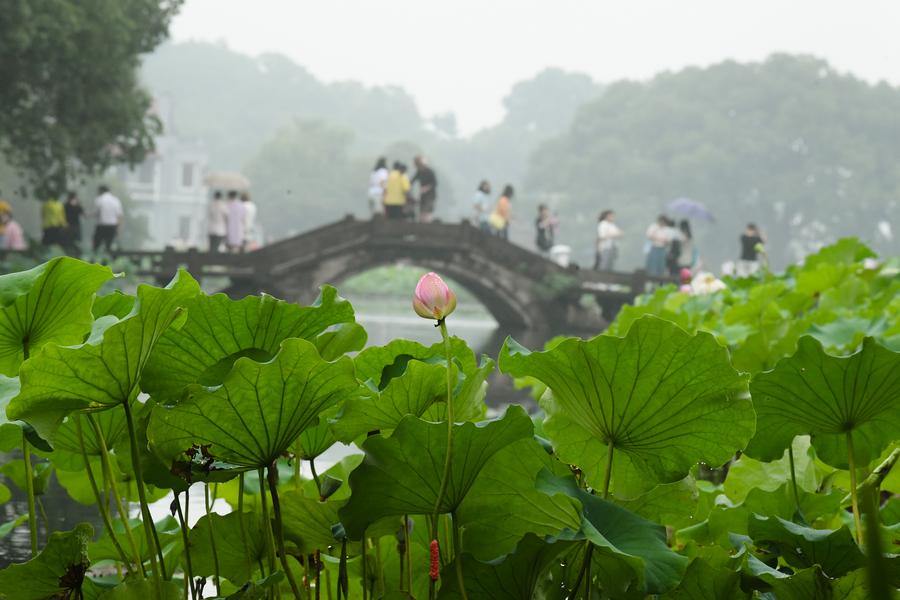Editor’s Note: Covid-19 threat has raised up in Zhejiang cities. As reported, Zhejiang found 57 new cases on Wednesday, bringing the total number of COVID-19 cases to 293. When Chinese Spring Festival is around the corner and large amount of population mobility can hinder the pandemic prevention and control, Ningbo issued a policy that offers incentives for non-local employees to stay out during the traditional holidays. Today’s Zhejiang Highlights will provide you some briefings related to Covid-19 precautionary measures, ranks of household garbage sorting, and power consumption.
1. Ningbo offers an allowance for non-local employees to stay put for Spring Festival
A maximum allowance of 500 yuan ($78.60) per person will be given to non-local employees who remain in Ningbo, Zhejiang province, to celebrate Spring Festival. The allowance is designed to reduce the spread of the coronavirus and promote production during the festival, according to a notice released on Tuesday by the Ningbo municipal government.
The allowance — 100 yuan per person per day, with no more than 500 yuan total per person — will be given to employees who work on the front lines of industrial enterprises above designated size, trade enterprises above-designated size, and major project construction enterprises in Ningbo from Jan 26 to Feb 10 and who have paid their social insurance during December in Ningbo.
Enterprises and industry associations are encouraged to give employees some social welfare, such as discount coupons for accommodations and catering or free coupons for movies and tourist attractions.
2. Huzhou ranks first for household garbage sorting in 2021
Huzhou was recently ranked first among 293 prefecture-level cities in China in a national assessment for household garbage sorting in 2021. The evaluation was conducted by the Ministry of Housing and Urban-Rural Development for the first time.
Huzhou saw a 3.05 percent year-on-year decrease in household waste this year to date. This is the third year in a row that it has reported a decline. The city's capability in garbage treatment has improved significantly. This year, the city extracted 4,895 metric tons of oil grease from rubbish and generated 521 million kilowatts of electricity, in turn reducing carbon emissions by 460,000 tons. The daily amount of recycled garbage in Huzhou has surpassed 600 tons, with a recycling rate standing at 61.6 percent.
The city has spent nearly 2 billion yuan to build garbage treatment facilities. Huzhou has built four garbage incineration plants, four kitchen waste disposal sites and one solid waste complex disposal site. These sites have a combined daily processing capacity of 7,500 tons of garbage. The city has also set up a unified garbage sorting management platform that is capable of monitoring all stages of the garbage disposal process, including garbage classification, collection, and transportation.
In addition, the local government has come up with a slew of innovative measures to promote garbage sorting, including the establishment of a garbage sorting management research institute and the service hotline-2201212.
3. Zhejiang's annual power consumption exceeds 500b kWh
Over the first 11 months of this year, power consumption in East China's Zhejiang province rose by 15.4 percent year-on-year to 503.8 billion kWh, bringing the province's annual power consumption beyond 500 billion kWh for the first time in history. Following Shandong, Guangdong, and Jiangsu provinces, Zhejiang became the fourth Chinese province to exceed the 500-billion-kWh threshold in annual power consumption.
Over the first three quarters of this year, Zhejiang's power consumption reached 417 billion kWh, up 18.07 percent from the previous year. The surge in electricity usage was largely due to the province's booming export-oriented manufacturing sectors such as automobiles, home appliances, and textiles. The growth rate in power consumption dropped in the fourth quarter due to a nationwide strain in electricity supply and tightening restrictions on carbon emissions.
4. Taizhou Bay Bridge wins national recognition
The Taizhou Bay Bridge project recently won the 2021 Luban Award, a prestigious prize for design and construction conferred by the China Construction Industry Association. The Luban Award has been awarded biennially since 1987.
Spanning 102.38 kilometers, the Taizhou Bay Bridge started construction in 2014 and was opened to traffic in January 2019. The bridge is a key part of the Taizhou Coastal Highway, the largest transportation construction project in Taizhou's history.
5. Autumn leaf festival falls in Hangzhou
The annual Autumn Leaf Festival of the China Academy of Art kicks off on Dec 11. The green horse sculpture made of parasol leaves is a homophone for "green code", a clever way to wish Hangzhou the best in the battle against the pandemic.
A three-meter-high sculpture is installed at the Nanshan Road Campus of China Academy of Art in Hangzhou. The sculpture, made from fallen leaves and shaped like an inverted astronaut, marks the beginning of the annual Autumn Leaf Festival.
Editor: Huang Yan




